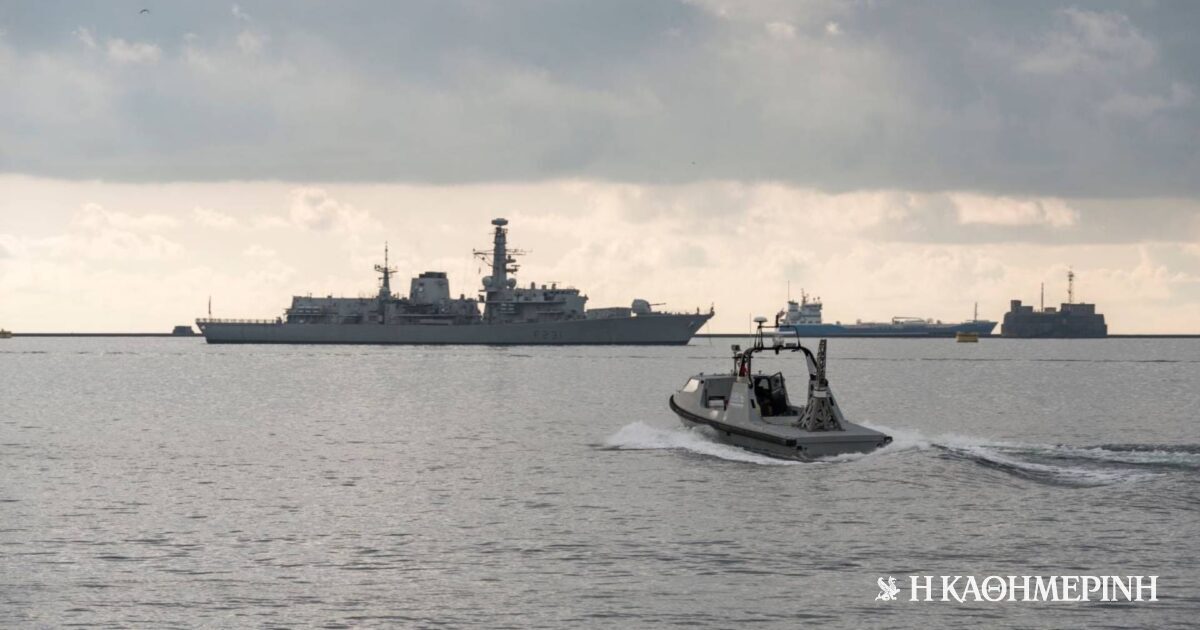
The “successes” of Ukrainian ships (unmanned surface vehicles) against Russian warships and infrastructure do not go unnoticed by the Navy.
The corresponding systems have long been under the “microscope” of the Hellenic Armed Forces, while according to the information received from “K”, the General Staff of the Navy initiated the preparation of a study of operational requirements, which was approved by the Supreme Naval Council (ANS). ) and will soon be submitted for approval to the Council of Chiefs of the General Staff (CJS).
“We know exactly what we want.”
The GEN has been tasked with evaluating available systems to a group of experienced Navy officers with experience in autonomous systems. Already in 2021, the “Task Force” of GEN, with its presence at all major defense exhibitions in Europe, the United States and the Middle East, has examined the capabilities of NATO and non-USV, but also systems manufactured by Greek companies while information has it gone before A few months to Saudi Arabia to see field tests of certain systems.
“Operational requirements are set according to the threat,” a senior source at GEN tells K. “We look at parameters like the guidance system, whether it will be directed via satellite or by visual contact, the explosives it will carry depends on the size and type of target but also on where and how much we want to hit.”
However, since Turkey has already initiated domestic production of US marine vehicles, the Navy is also studying ways to deal with it. According to the same sources, the upgrade of the four MEKO frigates provides for the installation of an electronic warfare suite and also an anti-drone system, which, through interference, will prevent the drone from communicating with the control station. A similar system is expected to be installed at FDIBelharra, France.
“No progress with LCS”
A senior military source told “K” that the Navy is studying in early 2020 all available options for used ships that will have the role of an intermediate solution to meet the requirements of 18 large surface units, as set by the 2021-2034 structuring forces.
Ships from the Netherlands, Belgium, Italy and France were assessed in this context, but not from the USA. “We can’t call an officer’s tour of the ship an appraisal. In an appraisal, we ask to check the working hours and the damage list to know exactly what the condition of the ship is,” says the same source. “If we have the opportunity, we will do it, but at the moment, there is no interest either from us or from the American side,” confirms a high-ranking source in the general, and adds: “We have a force structure consisting of 18 main force units, this number has not been achieved neither with “The three FDIs and neither with the cruisers. Whatever opportunity there is, the National Police will consider it. So far, there is no interest in the LCS. If they tell us that Dutch or German ships will be decommissioned, we will be interested.”
Problematic about “bleeding” executives
As the Navy prepares to receive the latest weapons systems, the mass resignations of executives are ringing a “bell” in the military and political leadership of the armed forces.
Since the beginning of August, 43 officers, nine of whom were rear admirals and vice admirals, had left the Navy in search of better working conditions and salaries in the private sector. Meanwhile, the drop in the admission base for naval schools by 12.3% for combat and 4.2% for engineers is causing a “headache” for the future of not only the Navy but the Armed Forces as a whole as shown in the picture. Not much different in other producing schools. According to the information, the military leadership had previously recommended to the government to prepare a special salary for the armed forces in order to deal with the “bleeding” of individuals, especially young people with the special knowledge necessary to operate modern weapons systems. .

“Hipster-friendly coffee fanatic. Subtly charming bacon advocate. Friend of animals everywhere.”





More Stories
F-16 crashes in Ukraine – pilot dies due to his own error
Namibia plans to kill more than 700 wild animals to feed starving population
Endurance test for EU-Turkey relations and Ankara with Greece and Cyprus